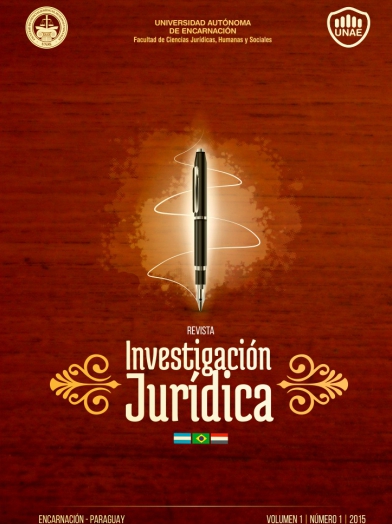EL ALCOHOLISMO Y LA PATRIA POTESTAD
Resumen
Esta investigación ha sido llevada a cabo con la finalidad de conocer las dificultades jurídicas, administrativas, operacionales e institucionales por las que el alcoholismo de los padres no es aplicado como causal de suspensión de la patria potestad y averiguar el conocimiento, opinión y actitud de los estudiantes de la carrera de Trabajo Social y de Derecho sobre el tema investigado. Se ha desarrollado un estudio de carácter descriptivo con una metodología cuali-cuantitativa. Para el trabajo de campo se recurrió a una entrevista estructurada a la Defensora de la Niñez y de la Adolescencia de Encarnación y una encuesta de tipo Likert a los estudiantes en situación de tesis de las carreras de Derecho y Trabajo Social de la Facultad de Ciencias jurídicas, Sociales y Humanas de la Universidad Autónoma de Encarnación. Se ha concluido que las dificultades para aplicar dicha causal son la falta de mención expresa por parte de la Ley N° 1680/2001 del alcoholismo como causal de suspensión de la patria potestad, la protección de la integridad de la familia y el déficit operacional, administrativo e institucional. Mientras que los encuestados han demostrado bastante conocimiento con relación al tema propuesto y una opinión y actitud positiva frente a la primacía del Interés Superior del Niño.Palabras claves: familia – alcoholismo - patria potestad - interés superior del niño - jurisdicción especializada.
Abstract
This research has been carried out with the purpose of knowing the legal difficulties, administrative, operational by the alcoholism of the parents is not applied as a causal agent of suspension of the parental authority and find out the knowledge, opinion and attitude among students of the social work and Law on alcoholism as indicated. Has been developed a descriptive study with a methodology qualitative-quantitative. In the realization of field work was resorted to a structured interview with the advocate of childhood and adolescence of Incarnation and a Likert-type survey to students in situation of the thesis of the careers of Law and Social Work at the Faculty of Law, Social and Human at the Autonomous University of Encarnation. It has been concluded that the difficulties in applying such causation is the lack of explicit mention of the Law N° 1680/2001of alcoholism as a causal agent of suspension of the parental rights, the protection of the integrity of the family and the operational deficit, administrative and institutional. While respondents have demonstrated considerable knowledge in relation to the proposed topic and a opinion and positive attitude to the primacy of the child's best interests.
Key words: family – alcoholism - parental rights - the best interests of the child - specialized jurisdiction.
Citas
CÓDIGO DE LA NIÑEZ Y DE LA ADOLESCENCIA. Ley 1860/2001. (2010).
Editorial Servilibro. Asunción.
CONSTITUCIÓN DE LA REPÚBLICA DEL PARAGUAY. (2010). Editorial Diógenes. Asunción. Pág. 17.
Eisenberg, N.; Fabes, R. A. y Murphy, B. C. (1996) Parent´s reactions to children´s negative emotions: Relations to children´s social competence and confortingbehavior,Child Development,61 (1) p. 113-126.
Kochanska, G. (1997) “Mutually responsive orientation betwenmathers and their young children”,Child Development, 68 (1), pp. 94-112.
Krevans, J. y Gibbs, J. C. (1996). Parent´s use of inductive discipline: Relations to children sempaty and prosocial behavior,Child Development, 67, (6), pp. 3267-3277.
López de Quevedo, S. (2004). Jurisdicción de la niñez y la adolescencia. Asunción – Paraguay. Pág. 93.
Moreno Rufinelli, J.A. (2010). Derecho Civil. Familia.
OMS. Alcohol. (2004)http://www.who.int/mediacentre/factsheets/fs349/es/.
Villagra de Diedermann, S. Garcete, M. T. Bogarín Alfons, R.A. Corte Suprema de Justicia. (2009). Tomo I. As.Py. pág. 45, 51, 187. Recuperado de:www.pj.gov.py/ebook/libros.../Interes_Superior_del_Niño_Tomo_I.pdf.
Descargas
Publicado
Número
Sección
Licencia
La responsabilidad del contenido de los artículos publicados es de competencia exclusiva de los firmantes del artículo y de ninguna manera será atribuible a la Editora o al Comité Editorial de la revista.
Los autores de los artículos son los responsables de la obtención del permiso correspondiente para incluir en su artículo cualquier material publicado en otro lugar. La revista declina cualquier responsabilidad que se derive de la posible falta de permiso en la reproducción de cualquier material.
Los autores ceden a la Revista la propiedad de sus derechos de autor, para que los artículos sean publicados en cualquier forma o medio.
La Revista se reserva todos los derechos de autor y la reproducción de los documentos en otros medios impresos y/o electrónicos que debe estar autorizada por el Editor.

